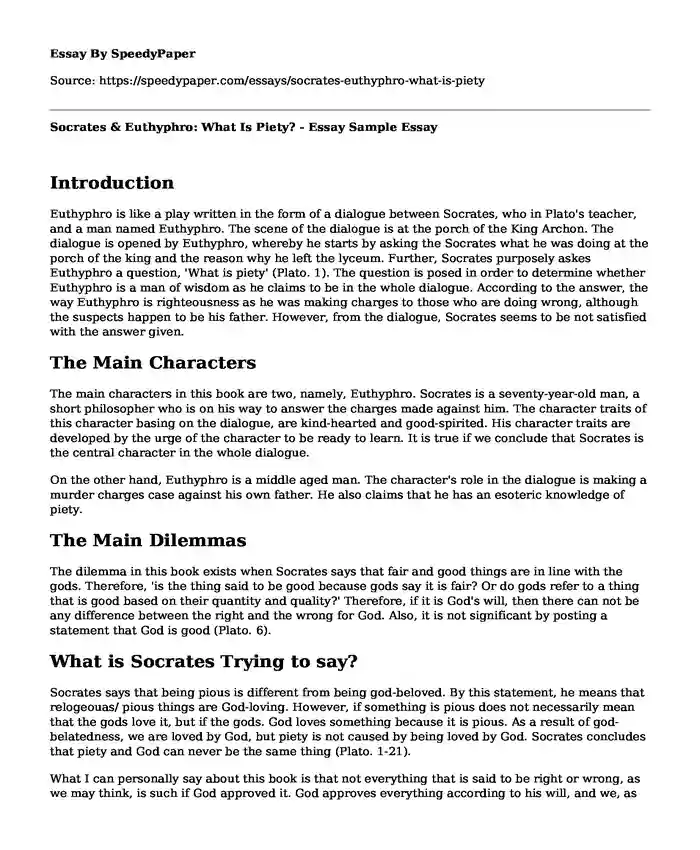
| Type of paper: | Essay |
| Categories: | Literature Philosophy Plato |
| Pages: | 3 |
| Wordcount: | 580 words |
Introduction
Euthyphro is like a play written in the form of a dialogue between Socrates, who in Plato's teacher, and a man named Euthyphro. The scene of the dialogue is at the porch of the King Archon. The dialogue is opened by Euthyphro, whereby he starts by asking the Socrates what he was doing at the porch of the king and the reason why he left the lyceum. Further, Socrates purposely askes Euthyphro a question, 'What is piety' (Plato. 1). The question is posed in order to determine whether Euthyphro is a man of wisdom as he claims to be in the whole dialogue. According to the answer, the way Euthyphro is righteousness as he was making charges to those who are doing wrong, although the suspects happen to be his father. However, from the dialogue, Socrates seems to be not satisfied with the answer given.
The Main Characters
The main characters in this book are two, namely, Euthyphro. Socrates is a seventy-year-old man, a short philosopher who is on his way to answer the charges made against him. The character traits of this character basing on the dialogue, are kind-hearted and good-spirited. His character traits are developed by the urge of the character to be ready to learn. It is true if we conclude that Socrates is the central character in the whole dialogue.
On the other hand, Euthyphro is a middle aged man. The character's role in the dialogue is making a murder charges case against his own father. He also claims that he has an esoteric knowledge of piety.
The Main Dilemmas
The dilemma in this book exists when Socrates says that fair and good things are in line with the gods. Therefore, 'is the thing said to be good because gods say it is fair? Or do gods refer to a thing that is good based on their quantity and quality?' Therefore, if it is God's will, then there can not be any difference between the right and the wrong for God. Also, it is not significant by posting a statement that God is good (Plato. 6).
What is Socrates Trying to say?
Socrates says that being pious is different from being god-beloved. By this statement, he means that relogeouas/ pious things are God-loving. However, if something is pious does not necessarily mean that the gods love it, but if the gods. God loves something because it is pious. As a result of god-belatedness, we are loved by God, but piety is not caused by being loved by God. Socrates concludes that piety and God can never be the same thing (Plato. 1-21).
What I can personally say about this book is that not everything that is said to be right or wrong, as we may think, is such if God approved it. God approves everything according to his will, and we, as human beings, should be ready to conform to His will. Moreover, from the Book, Socrates is good-hearted, and this one of the ways of fulfilling God's will.
The relevance of this book
The book is most relevant in modern society and metaphysics. I can say that the supreme God creates everything that is in the universe, and he is the one who approves anything. For instance, piety can be discussed in modern-day and society as being approved by God's approval. God also approves piety in our daily lives, so we realize his manifestation in our lives.
Work Cited
Plato, C. Euthyphro. Kessinger Publishing, 2004.
Cite this page
Socrates & Euthyphro: What Is Piety? - Essay Sample. (2023, Nov 28). Retrieved from https://speedypaper.net/essays/socrates-euthyphro-what-is-piety
Request Removal
If you are the original author of this essay and no longer wish to have it published on the SpeedyPaper website, please click below to request its removal:
- Free Essay on Finding Inspiration for Academic Writing
- Literary Essay Sample: Role of Context in Interpretation of Meaning
- Amiri Baraka Conversion to Islam and Influence of Other Ideologies, Poetry Essay Example
- Essay Example on Kurtz's Problem in Heart of Darkness by Joseph Conrad
- Free Essay on the Hamlet Summary: Plot, Character, Diction, Spectacle, Thought, and Song
- Paper Example on Coat of Arms
- Essay Sample on Edgar Allan Poe "Annabel Lee"
Popular categories




